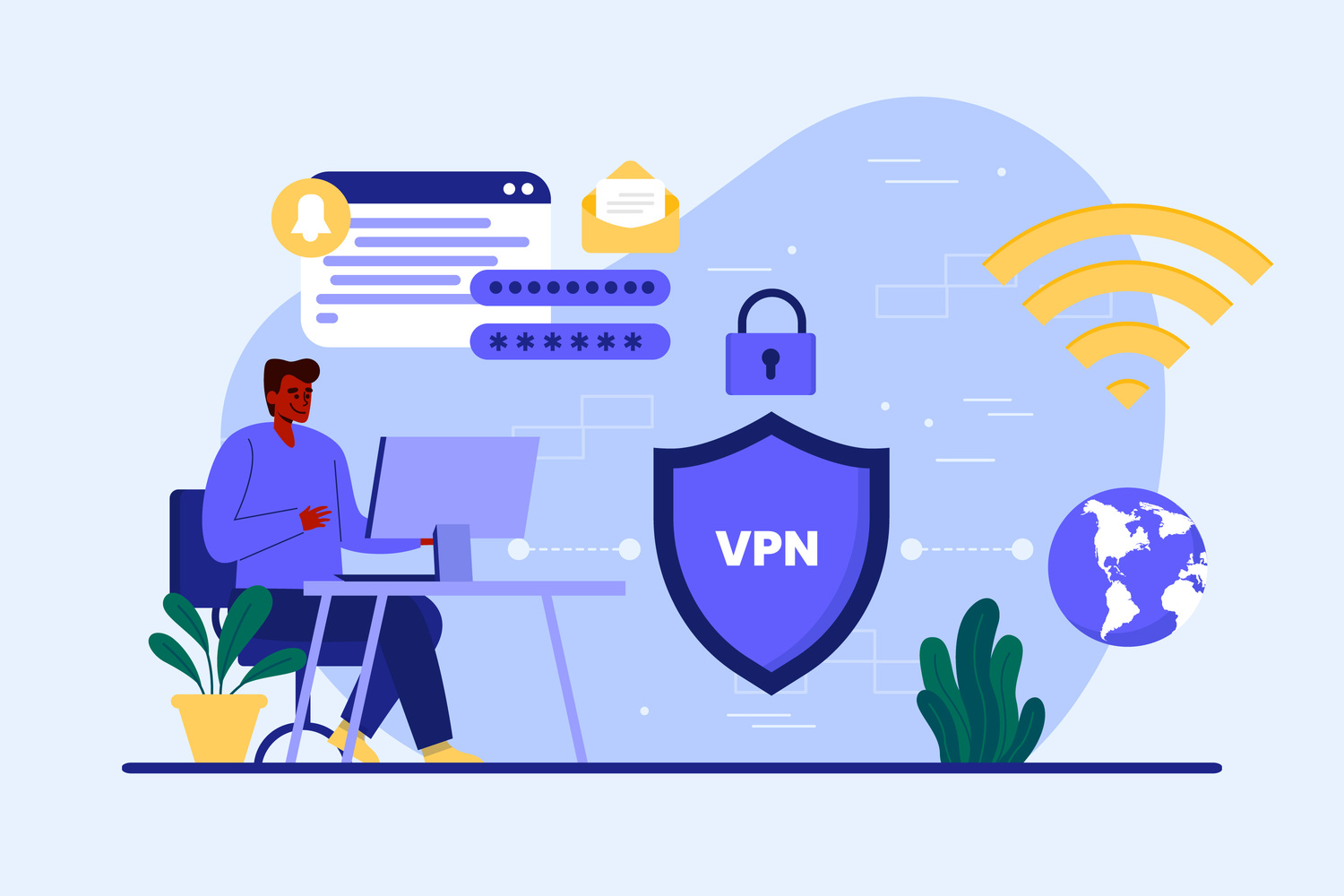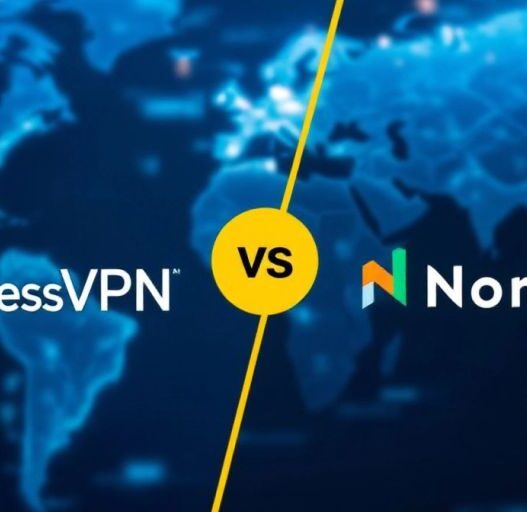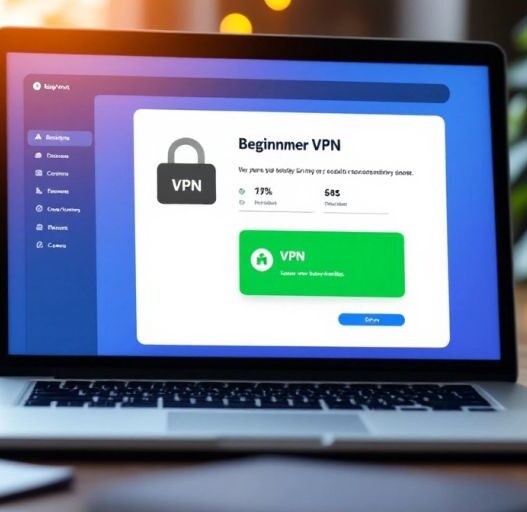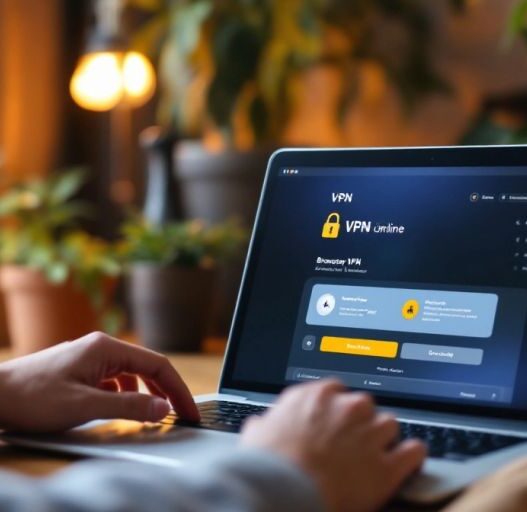In 2024, the use of Virtual Private Networks (VPNs) has skyrocketed, with more people than ever relying on these tools to protect their online privacy and security. The growing awareness of digital threats and the need for safe internet access have led to a surge in VPN adoption across the globe. This article explores the key statistics and trends shaping the VPN landscape this year, providing insights into user demographics, market dynamics, and the future of VPN technology.
Key Takeaways
- VPN usage is expected to exceed 1 billion users globally in 2024.
- Leading VPN providers like ExpressVPN, Surfshark, and NordVPN dominate the market.
- Approximately 46% of American adults currently use a VPN, reflecting a significant increase in awareness and adoption.
- Remote work has been a major factor driving VPN popularity, with many users relying on them for secure access to company networks.
- Concerns about online privacy and security continue to push more individuals to consider VPNs as essential tools for their internet use.
Global Surge in VPN Adoption
The use of Virtual Private Networks (VPNs) has seen a remarkable increase in recent years, driven by various factors that highlight their importance in today’s digital landscape. VPNs provide users with enhanced security and privacy, making them a popular choice for internet users worldwide.
Factors Driving Increased VPN Use
- Increased Awareness: More people are becoming aware of the benefits of VPNs, with 95% of American adults familiar with them by 2022.
- Remote Work: The shift to remote work during the pandemic has led to a surge in VPN usage, as employees seek secure connections to company networks.
- Access to Content: Users often turn to VPNs to bypass geo-restrictions and access entertainment content that may not be available in their region.
Regional Adoption Rates
| Region | VPN Usage Rate |
|---|---|
| Asia Pacific | 35% |
| Middle East & Africa | 35% |
| Latin America | 31% |
| North America | 34.6% |
Impact of Remote Work on VPN Popularity
The COVID-19 pandemic has significantly impacted VPN usage:
- 124% increase in VPN use in the U.S. during the early days of the pandemic.
- 41% global increase in demand for VPNs in March 2020.
- Even as restrictions ease, VPN demand remains 22% higher than pre-pandemic levels.
The rise in VPN adoption reflects a growing concern for online privacy and security, as users seek to protect their personal information in an increasingly digital world.
As VPN growth trends continue to evolve, users are encouraged to explore top VPN services that offer robust features and reliable performance. Investing in a VPN not only enhances online security but also opens up a world of content that may otherwise be restricted.
Call to Action
For those looking to enhance their online experience, consider trying out leading VPN providers. They offer various features tailored to meet the needs of different users, ensuring a secure and unrestricted internet experience.
Leading VPN Providers in 2024

As the demand for online privacy and security continues to rise, VPNs (Virtual Private Networks) have become essential tools for many internet users. They help protect personal information and allow users to access restricted content safely. In 2024, several VPN providers stand out due to their features, user satisfaction, and market presence.
Market Share of Top VPN Services
The VPN market is growing rapidly, with a projected value of $92.6 billion by 2027. Here are some of the leading VPN providers in 2024:
| VPN Provider | Market Share | Key Features |
|---|---|---|
| NordVPN | 30% | Military-grade encryption, no-logs policy |
| ExpressVPN | 25% | Fast speeds, user-friendly interface |
| Surfshark | 20% | Unlimited devices, affordable pricing |
| Proton VPN | 15% | Strong privacy features, free version |
| Private Internet Access | 10% | Customizable settings, good for power users |
User Preferences and Satisfaction
User satisfaction is crucial for VPN providers. Here are some common preferences among users:
- Speed: Users prefer VPNs that offer fast connection speeds.
- Privacy: A no-logs policy is essential for many users.
- Ease of Use: Simple interfaces and easy setup are highly valued.
Innovative Features and Offerings
VPN providers are constantly innovating to meet user needs. Some notable features include:
- Multi-hop connections: Routing through multiple servers for added security.
- Split tunneling: Allowing users to choose which apps use the VPN.
- Kill switch: Automatically disconnecting the internet if the VPN fails.
VPNs are not just tools for privacy; they are gateways to a safer internet experience.
In conclusion, as VPN usage continues to grow, choosing the right provider is essential. Users should consider factors like speed, privacy, and innovative features when selecting a VPN. With the right VPN, individuals can enhance their online security and enjoy unrestricted access to the internet.
Demographics of VPN Users

As VPN usage statistics for 2024 show a significant rise, understanding who uses these services is crucial. VPNs, or Virtual Private Networks, provide a secure way for individuals to browse the internet while protecting their privacy. They are increasingly popular among various demographics, driven by the need for online security and access to restricted content.
Age and Gender Distribution
- 57% of VPN users are male, while 43% are female. This indicates a notable gender gap in VPN usage.
- The most common age group using VPNs is 45 to 60 years old, making up 28% of users.
- Younger generations, particularly Gen Z and Millennials, also show high usage rates, with 39% and 36% respectively.
Usage Patterns Across Different Regions
| Region | VPN Usage Rate |
|---|---|
| Asia Pacific | 35% |
| Middle East & Africa | 35% |
| Latin America | 31% |
| North America | 5% |
- Countries like Indonesia (61%) and India (45%) lead in VPN usage, while Australia (4%) and the UK (5%) have the lowest rates.
- VPNs are often used for both personal and business purposes, with 29% of users relying on them solely for personal use.
Motivations for Using VPNs
- Security: Nearly half of users prioritize security to avoid identity theft.
- Privacy: About 40% use VPNs to protect their personal data from being tracked.
- Access: Many users leverage VPNs to bypass geo-restrictions and access content unavailable in their region.
VPNs are becoming essential tools for internet users, reflecting a growing awareness of online privacy and security needs.
In conclusion, the demographics of VPN users reveal a diverse group motivated by security, privacy, and access to content. As awareness continues to grow, VPNs are likely to become even more integral to online behavior.
Security and Privacy Concerns
As VPN usage continues to grow, so do the concerns surrounding security and privacy. VPNs are often seen as a solution to protect online activities, but they come with their own set of risks. Understanding these concerns is crucial for users looking to safeguard their digital presence.
Common Security Risks with VPNs
- Data Leaks: Some VPNs may inadvertently expose user data through DNS or IP leaks.
- Weak Encryption: Not all VPNs use strong encryption methods, making data vulnerable to interception.
- Malware Risks: Free VPNs can sometimes include harmful software that compromises user security.
User Experiences with Free vs. Paid VPNs
| Feature | Free VPNs | Paid VPNs |
|---|---|---|
| Data Limits | Often limited | Unlimited |
| Speed | Generally slower | Faster connections |
| Customer Support | Minimal support | 24/7 support |
| Security Features | Basic security | Advanced security |
Measures to Enhance VPN Security
- Choose Reputable Providers: Opt for well-reviewed VPN services with a strong privacy policy.
- Regular Updates: Ensure the VPN software is updated frequently to patch vulnerabilities.
- Enable Kill Switch: This feature disconnects the internet if the VPN connection drops, preventing data leaks.
In a world where online privacy is increasingly at risk, users must remain vigilant and informed about the VPNs they choose to use.
In conclusion, while VPNs offer significant benefits for privacy and security, users must be aware of the potential risks involved. By selecting reliable services and implementing best practices, individuals can better protect their online activities.
Future Trends in the VPN Market
As we look ahead to 2024, the VPN market is poised for significant growth, driven by various factors that reflect changing user needs and technological advancements. The global VPN market is expected to reach $350 billion by 2032, highlighting the increasing importance of online privacy and security.
Predicted Market Growth
- The VPN market was valued at $45 billion in 2022.
- A compound annual growth rate (CAGR) of approximately 22% is anticipated over the next decade.
- Cloud VPNs are expected to dominate, making up 73% of the market share due to their cost-effectiveness and ease of use.
Emerging Technologies in VPNs
- Integration with AI: AI is being used to enhance security features and improve user experience.
- Multi-hop VPNs: This feature routes traffic through multiple servers for added security.
- Mobile VPNs: With the rise of mobile internet usage, mobile VPNs are becoming increasingly popular.
Potential Challenges and Opportunities
- Challenges:
- Increased competition among VPN providers.
- Regulatory changes affecting VPN usage in various regions.
- Opportunities:
- Growing awareness of online privacy among consumers.
- Expansion into emerging markets, particularly in Asia-Pacific.
The future of VPNs is not just about security; it’s about creating a seamless and safe online experience for users worldwide.
In conclusion, as VPNs continue to evolve, users should consider top providers like NordVPN, ExpressVPN, and ZenMate for their robust features and reliability. Staying informed about these trends will help users make better choices for their online security needs.
Impact of VPNs on Digital Behavior

As VPNs become more popular, they significantly change how people interact online. VPNs offer a secure way to browse the internet, protecting users’ privacy and allowing access to restricted content. This shift in digital behavior is driven by various factors, including the need for security, privacy, and unrestricted access to information.
Changes in Online Privacy Practices
- Increased Awareness: More users are aware of their online privacy, with 95% of adults familiar with VPN technology.
- Adoption Rates: Approximately 46% of adults now use VPNs, indicating a growing trend towards protecting personal data.
- Usage for Security: Many users rely on VPNs to secure their connections, especially on public Wi-Fi networks.
VPNs and Access to Geo-Restricted Content
- Entertainment Access: VPNs allow users to access streaming services that may be restricted in their region, such as Netflix and Amazon Prime.
- Global Reach: Users can enjoy content from different countries, enhancing their viewing options.
- Increased Demand: The demand for VPNs has surged, with many users seeking better entertainment options.
Influence on Internet Censorship
- Bypassing Restrictions: VPNs help users bypass government censorship and access blocked websites.
- Freedom of Information: They promote a more open internet, allowing users to find information freely.
- User Empowerment: VPNs empower users to take control of their online presence and protect their rights.
VPNs are not just tools for security; they are gateways to a more open and private internet experience.
In conclusion, the rise of VPNs is reshaping digital behavior by enhancing privacy, expanding access to content, and challenging censorship. As more people recognize the importance of online security, the demand for reliable VPN services will continue to grow. Users are encouraged to explore top VPN providers to find the best fit for their needs.
Conclusion
In summary, the growth of VPN use in 2024 shows how important these tools have become for many people. With more than 105 million Americans now using VPNs, it’s clear that concerns about privacy and security are driving this trend. While VPNs offer many benefits, such as safer internet browsing and access to restricted content, they also come with challenges. Issues like cybersecurity risks and user satisfaction need to be addressed as more people turn to these services. The data from this year emphasizes the need for ongoing improvements in VPN technology. As our online world keeps changing, VPNs will play a key role in protecting users’ privacy and freedom.
Frequently Asked Questions
What is a VPN and why do people use it?
A VPN, or Virtual Private Network, is a tool that helps keep your online activities private and secure. People use VPNs to protect their personal information, access blocked websites, and stay safe when using public Wi-Fi.
How many people are expected to use VPNs in 2024?
In 2024, it’s predicted that around 105 million Americans will be using VPNs, which is about 46% of adults.
What are the main reasons people choose to use VPNs?
Most people use VPNs to keep their online activities private, access content that might be blocked, and connect securely to their work networks.
Which VPN services are the most popular in 2024?
Some of the most popular VPN services in 2024 include NordVPN, Proton VPN, and Google One VPN, with Google One gaining popularity for being free with certain subscriptions.
Are free VPNs safe to use?
Free VPNs can be risky. Many users report slow internet speeds and some may even have security issues, making paid VPNs a safer option.
What trends are shaping the VPN market in 2024?
The VPN market is growing rapidly, driven by concerns over online privacy and the increase in remote work. More people are becoming aware of the importance of using VPNs for security.























